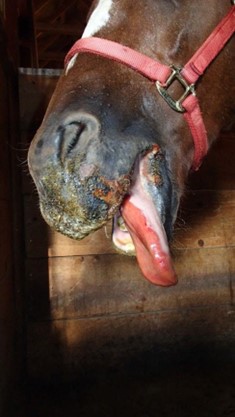 By Miriam Raftery
By Miriam Raftery
May 28, 2023 (San Diego’s East County) – The U.S. Department of Agriculture and the U.S. Equestrian Foundation (USEF) will hold a webinar on May 31 at 1 p.m. Pacific Standard Time on Vesicular Stomatis Virus (VSV), a contagious livestock disease that has spread to at least six different communities in San Diego County. Registration is required for the webinar, which will be held on Zoom. Register here.
Dr. Angela Pelzel McCluskey, USDA equine epidemiologist, will provide an overview of Vesicular Stomatitis and the current situation report also providing perspective based on her firsthand experience managing numerous VS outbreaks in her previous roles. Dr. Katie Flynn,USEF Equine Health and Biosecurity veterinarian, will cover prevention measures for horses and their premises, as well as the biosecurity requirements being implemented at those USEF events with horses competing from VS Affected States.
As of Friday, the U.S. Department of Agriculture reports that 23 properties are quarantined due to VSV, including 18 sites in San Diego County—seven more than in the last report five days earlier. All but one case in the outbreak have occurred in equine species such as horses, but there is one suspected case in a “backyard beef steer” at a local property with three cattle. The remaining cases are in Riverside County.
The USDA has not responded to our media inquiry for specific locations impacted in our region, but the Ramona Sentinel reports that the first six confirmed cases since the outbreak began May 17 were in Ramona, Lakeside, Campo, Jamul, Del Sur, and Descanso, according to local veterinarians. San Diego and Riverside counties are the only places in the nation with current cases.
Recent comments